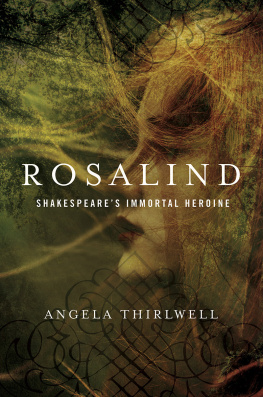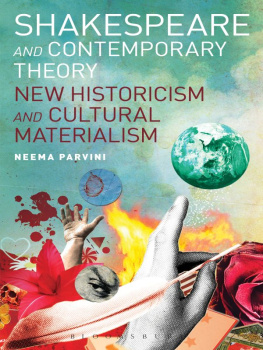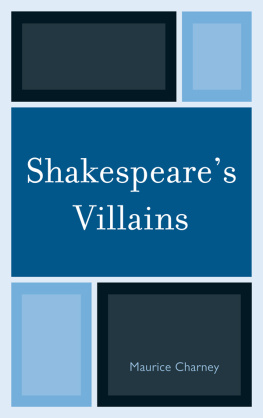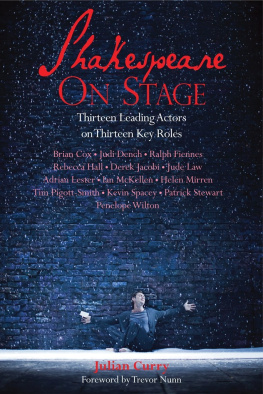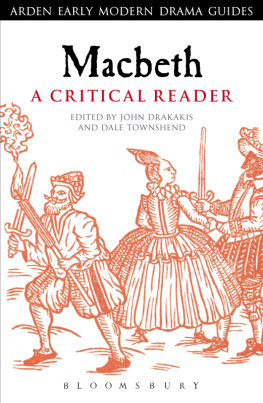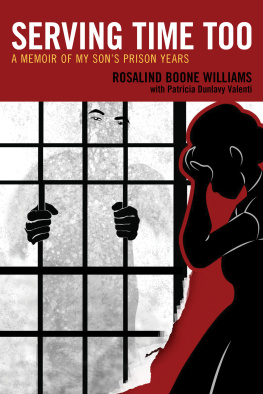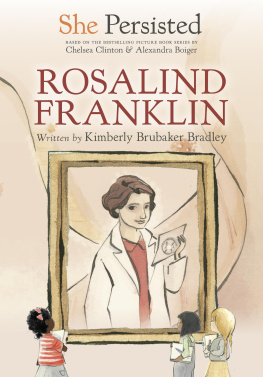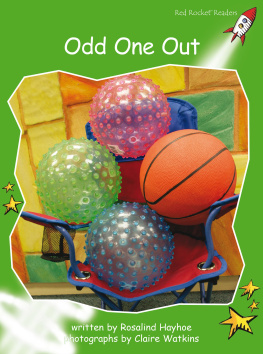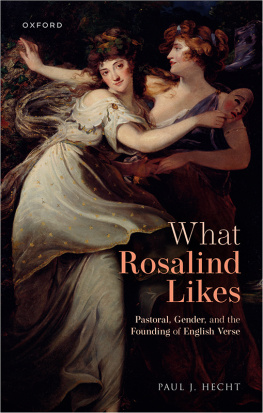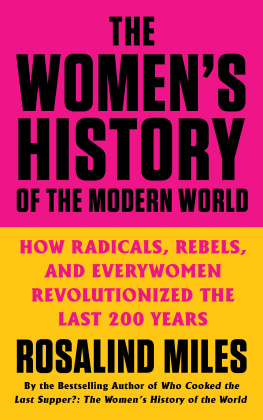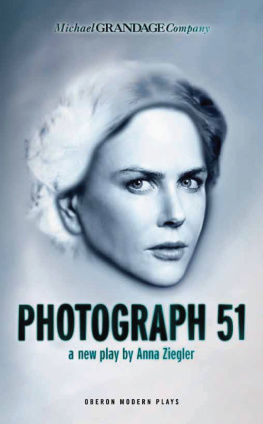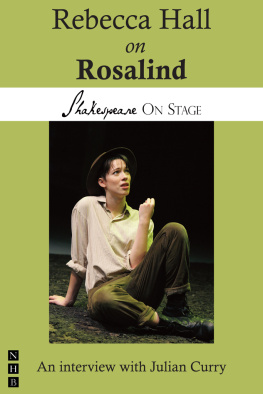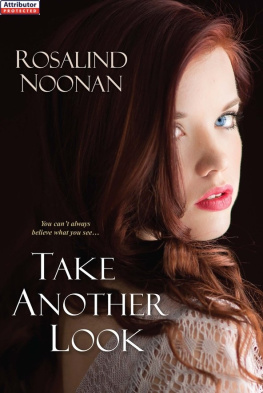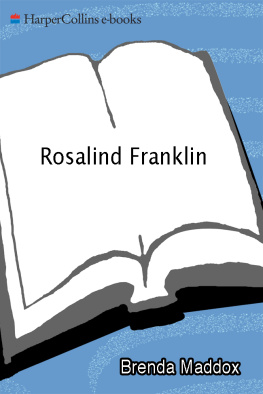
ROSALIND
SHAKESPEARES IMMORTAL HEROINE

ANGELA THIRLWELL

Whoever has the luck to be born a character can laugh even at death.
LUIGI PIRANDELLO
Writing Rosalinds Biography
H ow can you write the biography of an imaginary character? A person who has never lived and therefore can never die. I like experimenting with biography, and freedom from inevitable death scenes feels liberating. This idea came to me after writing two biographies of multiple subjects who themselves faced the deaths of those closest to them. In William and Lucy: the other Rossettis (2003) the persistent tuberculosis of Lucy and her eventual harrowing death had a demoralising effect on an intimate marriage. Williams own decline into old age came twenty-five years later. Into the Frame: the four loves of Ford Madox Brown (2010) dealt with the deaths of Browns two wives, Elisabeth and Emma, one in early youth, the other after a long slide into alcoholism. These were key factors in unlocking personality and looking at his art. Browns own death, witnessed in deathbed accounts and portraits, had a morbid Victorian dimension. Of the two loves who survived him, Mathilde Blind died shortly afterwards, Marie Spartali Stillman looked death in the face much later with her famous grace and spirit. So many deaths, so much death. While being about life, biography is necessarily death infected.
So for a complete change, Ive chosen a person who though forever young, learns important truths through her life experience. Shakespeares Rosalind will never die. She is as humane and complex as any in Shakespeares parade of characters. Rosalind is a true original, a one-off, as well as a universal individual, but shes never alone. She always behaves in relation to other people, as any subject of a biography does. Although Rosalind dominates the comedy of As You Like It and is the emotional focus of the play, we never find her alone on stage, soliloquising. Her only speech that seems at first glance to be a soliloquy is her Epilogue but even that is a dynamic two-way conversation with her audience.
A fictional character from drama is different from a fictional character in a novel. Theatre is a communal, collaborative act. It depends on the contract with spectators to give life to a play and its characters. It is public and mutable, different with every performance and with every audience. This gives dramatic characters their special unpredictability and contradictoriness, an impression of his or her reality that is tantalisingly human. Shakespeare endows Rosalind with some of his most inventive, muscular language to transport her from stage and page into our very own world. In Pushkins words, Shakespeares characters are living beings, compacted of many passions and many vices; and circumstances unfold to the spectators their varied, many-sided personalities. Rosalind herself is mercurial, witty, brave, loving, mischievous and cruel, in varying proportions, at different times throughout the play. In other words, she has all the contradictions of an authentic person.
I wanted to present Rosalinds life within a framework that imitates the biographies of usual real-life subjects. At the end of As You Like It, Rosalind delivers an Epilogue. So to balance that Ive given her a Prologue, with the stage direction Enter Rosalind. I then begin with Rosalinds literary antecedents, move on to her sisters in other Shakespeare plays, then later to her cousin Celia, and her lover Orlando. The core of the biography explores key turning points in Rosalinds life, such as when she changes identity from female to male in Call me Ganymede, her love life as deep as the Bay of Portugal, her highhanded dealings with other people, and her powers as an impresario in the Epilogue. Finally, Rosalinds Afterlife asks who are her literary descendants, or Rosalinds daughters?
In the Interval theres time out for the audience to go to the bar, read the Programme, and in this case, engage with the only character in this book, apart from the actors Ive interviewed, to have lived in our world. She is Queen Elizabeth I Exploring the unexpected connections between Rosalind and Gloriana blurs the boundaries between what is real and what is imaginary, and reveals how each impacts on the other. While Rosalind is a creation of Shakespeares imagination, historians, playwrights and film directors have endlessly recreated and re-cast the Tudor queen. So where does reality begin or end?
Rosalind sashays across a stage, whether in open air or indoor spaces, in large national theatres, in small offbeat venues, in every country in the world where Shakespeare is performed. So, playfully, like Rosalind herself, I charted a way through the book marked by theatrical signposts, called Acts and Scenes instead of chapters. As a trip to the theatre often includes buying a programme, Ive supplied one at the back of the book which contains Family Trees, Cast List, Synopsis, famous phrases from As You Like It and a map of the Forest of Arden.
This is an unusual biography then of Shakespeares immortal Rosalind. Biographers often depend on the memoirs, autobiographies, diaries and letters left by their subject. Rosalind, of course, left me none of these resources. Except her words. This gives me creative freedom like the thrill of independence that Rosalind herself finds in Arden and beyond.
W hen I was thirteen my parents gave me Walter de la Mares anthology of poetry called Come Hither for the young of all ages. He made it sound such an enticing invitation. Come hither, gather round, and listen to a story in every season. That now damp-smelling book with its tattered jacket designed by Julia Trevelyan Oman is in my hands. Theres a magic blue landscape glimpsed through a forest where a deep dark pool, a snow-capped mountain and a peacock spreading his tail across the books spine still draw me in. Where the indigo foliage parts, theres a sunlit path through the woods that leads the eye ever onwards to a small comfortable palace beckoning me to Come Hither.
Under the greenwood tree
Who loves to lie with me
And turn [tune] his merry note
Unto the sweet birds throat,
Come hither, come hither, come hither!
Dipping into that anthology was the first time I fell in love with the language of As You Like It. My earliest experience of Shakespeare onstage had been three years earlier when I saw Frankie Howerd at the Old Vic as a wonderfully sexplicit Bottom in A Midsummer Nights Dream. The cast included Judi Dench as First Fairy.
By 1962 I was a schoolgirl in scratchy net ballerina petticoats. It was a Saturday matine at the Aldwych Theatre in London. From high up in the circle, I watched transfixed as Vanessa Redgrave, who was twenty-five, played Rosalind in the Royal Shakespeare Companys As You Like It. And it was, I found out, as I liked it. Redgraves unisex Rosalind in knee-length capri pants and denim cap was literally on the cusp between boy and girl. I was on the cusp, too, between child and teenager. It was a pivotal moment for me, a growing-up moment.
At the end of the play, after Rosalind has won Orlando with her love-play of words, there is a surprise. She steps forward to deliver the only epilogue Shakespeare ever entrusted to a female character. To the men in the audience she speaks as a woman and to the women in the audience she speaks as a man. Ive been both baffled and enchanted by Rosalinds remarks about beards and sweet breaths and curtsies. Even today its not entirely transparent to a modern audience.
Next page
